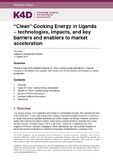| dc.contributor.author | Price, Roz | |
| dc.date.accessioned | 2017-09-28T12:09:47Z | |
| dc.date.available | 2017-09-28T12:09:47Z | |
| dc.date.issued | 2017-08-17 | |
| dc.identifier.citation | Price, R.A. (2017) “Clean” Cooking Energy in Uganda – technologies, impacts, and key barriers and enablers to market acceleration. K4D Helpdesk Report. Brighton, UK: Institute of Development Studies. | en |
| dc.identifier.uri | https://opendocs.ids.ac.uk/opendocs/handle/20.500.12413/13234 | |
| dc.description.abstract | The cooking energy mix in Uganda is dominated by unprocessed biomass, with charcoal the next most utilised fuel. “Clean” alternatives either relate to improved biomass cookstoves or switching to “clean” fuels such as liquefied petroleum gas (LPG), biogas and ethanol. However, access by poorer and rural communities to modern, clean fuel is currently limited by relatively high prices, low demand and unreliable supply; this is of particular importance in Uganda as the main supplies of LPG are imported. Changing to “clean” alternatives can have potential impacts on social and environmental factors, including limiting rates of deforestation, improving health, reducing the costs of cooking, time savings, and cleaner kitchens and cooking vessels. However, empirical evidence of the impact of such technologies, especially on health, remains limited and inconclusive, and is primarily focused on improved biomass stoves. If clean alternatives are to produce impacts they must be used correctly and consistently, and critically, they must come to displace the use of traditional stoves, without 'stacking' of polluting and improved technologies. There was an array of literature on this subject matter. The evidence was relatively strong, particularly related to Uganda and improved cookstoves. However, there was disagreement on the impacts of interventions especially in the field. A number of gaps exist for further and future research including but not limited to: more comprehensive knowledge of the market in Uganda, consumer behaviour, rural segments on less than USD3, switching to cleaner fuels, urban firewood users and the extent of use of improved cookstoves in Ugandan households. | en |
| dc.language.iso | en | en |
| dc.publisher | Institute of Development Studies | en |
| dc.relation.ispartofseries | K4D Helpdesk Report; | |
| dc.rights.uri | https://www.nationalarchives.gov.uk/doc/open-government-licence/version/3/ | en |
| dc.subject | Climate and Environment | en |
| dc.subject | Private Sector Development | en |
| dc.subject | Technology | en |
| dc.title | “Clean” Cooking Energy in Uganda – technologies, impacts, and key barriers and enablers to market acceleration | en |
| dc.type | Helpdesk | en |
| dc.rights.holder | DFID | en |
| dcterms.dateAccepted | 2017-08-17 | |
| rioxxterms.funder | Default funder | en |
| rioxxterms.identifier.project | K4D | en |
| rioxxterms.version | NA | en |
| rioxxterms.funder.project | 0986883a-6d0f-4bb8-9c46-5e0682934d65 | en |

